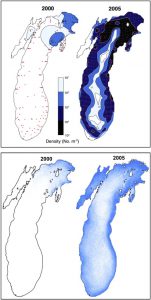A recent publication by NCCOS-funded scientists shows how new invasive species in the Great Lakes are easily dispersed by Lake Michigan and Lake Erie currents.

The team, led by Dr. Dima Beletsky of the NOAA Cooperative Institute for Great Lakes Research at the University of Michigan, modeled dispersal throughout the lakes from nearshore locations, such as ports or rivers where non-native species could enter. Using the typical, two to three week duration of the larval stage for two species – the golden mussel (not yet in the lakes) and the Eurasian ruffe fish (already present) – the research revealed that larvae are easily transported between a half mile to 10 miles to sometimes as much as 120 miles from the port of origin. The study also compared differences in dispersal between nearshore and offshore release points and mussel and ruffe larvae.
Study results can help resource managers improve strategies to monitor likely points of entries for invasive species, as well as design strategies to control the spread of a new species when first detected.
For more information, contact Felix.Martinez@noaa.gov.
Also, see:
Invasive Hitchhikers: Catching a Ride on Lake Currents. Featured Research, CIGLR Spring 2017 eNewsletter.
Modelling the Spread of Aquatic Invasive Species in Great Lakes. Water Canada, May 20, 2017.

